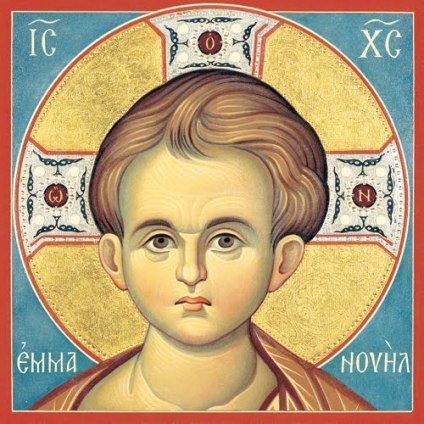
It is during these Christmas days that we hear another name applied to the Son of God, our Lord Jesus Christ. It is the name taken from the day of His birth in Bethlehem, and this name is Emmanuel. The first to say this name in a prophetic manner was Isaiah, who proclaimed eight centuries earlier: “Behold the Virgin shall conceive and bear a Son, and you shall call His name Immanuel” (Isaiah 7:14). St. Matthew the Evangelist recalls this prophecy from the words of the Angel, who announced to Joseph the birth of Jesus (see Matthew 1:23). The hymnographers of the Church also (their hymns inspired by scenes and words from the Holy Bible) composed a wonderful troparia around the name Emmanuel. Everyone remembers the hymn*: “O Isaiah, dance your joy, for the Virgin was indeed with child; and brought to birth a son, that Emmanuel, Who came as both God and man ...”. We see also the icon of the Lord, with the name Emmanuel on the wall paintings of Byzantine churches.
Have we stopped to reflect on the meaning of this name when we hear it?
We know that Adam and Eve, by their disobedience to God, broke communion with Him. The Son of God came into the world as a man in order to reconnect humanity with God, which we are currently celebrating with solemnity and devotion. In the case of Isaiah, he had foreseen that when people see God as a human being, living and interacting with the people, then they will call him Emmanuel – a name which means “God is with us”, God is in our midst. It was in this way that for the first time, people who were separated from God because of their sins not only heard God, but also spoke with Him. They saw Him with their own eyes, and touched Him. It was ultimately through Emmanuel-Jesus Christ, that humanity was united with the Triune God, and the long tragic separation of humanity from the Creator came to an end. The possibility of joyful eternal life became a reality once more.
As we know, this work was not easy at all, as the hymnographer declares:
“I behold a strange but very glorious mystery: Heaven – the cave;
the throne of the Cherubim – the Virgin; the manger – the receptacle in which Christ our God Whom nothing can contain, is lying…”
He humbled Himself to a point that the human mind cannot conceive! Not only that, but Emmanuel was already in danger as an infant, for Herod was looking to put Him to death. He experienced life as a refugee in Egypt, and in the end, suffered horribly in order to set humanity free from the bonds of sin, and elevate us to heaven. All of this was done out of love, for a “greater love has no one than this, to lay down one’s life for his friends”, as the Lord Himself said (John 15:13).
It is at this point then that a question arises, my dear ones: How do we respond to that great love of Emmanuel, and to His desire for us to be in constant communion with Him?
There are those who think that praying or going to Church to fulfill a duty for the sake of Christ is enough. They believe that in doing this, God owes them something! What ends up happening, is that when trouble comes to their lives, they complain to God. They do not understand that God is self-sufficient, and needs nothing from anyone. “God is love” (1 John 4:8), and because He is all love, whatever he does is for our benefit and to help us. If Emmanuel, who is “the Treasure of all Blessings,” wants us to be in communion with Him, it is in order for us to receive everything good that we need. That is why He also wants our relationship with Him to be one of love, for the Lord has said to us, “I have called you friends” (John 15:15). In looking at the example of two close friends, we see two people who love each other, and seek to be together often. Their happiness is in being with each other, and they never want to separate. This is how we should feel with Emmanuel. As the prophet Jeremiah says, he who has the divine love inside him does not become weary in following constantly after the Lord (see Jeremiah 17:12). St. Maximos the Confessor also writes, “The love for God offers wings to the mind” so that man may live constantly with God (400 Chapters on Love, IV:40).
My dear brothers and sisters. When I am in communion with Emmanuel, I never feel alone, even if everyone else has abandoned me. I am not overtaken by any fear whatsoever; “perfect love casts out fear” (1 John 4:18). I give thanks to God for everything good in my life, and entrust every pain to His love. I make the effort to provide for my needs, and at the same time ask for His help, since I need His blessing for all things. As the Lord said, “without Me you can do nothing” (John 15:5).
Let us open our hearts to a ceaseless relationship with Emmanuel, who came into the world to be with us. Let the grandeur of His endless love move us, and know that as we are joyfully communing with Emmanuel, we are receiving a foretaste of His Kingdom. Amen.
----------------------------------------------------------------------------------------
*Eirmos [original strophe] Mode Plagal of the First Tone 9th Ode [melody]





